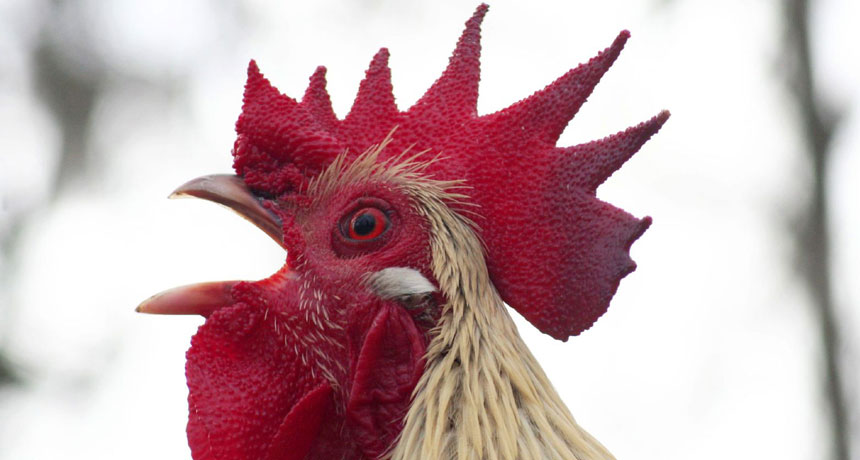Top rooster announces the dawn
Lower-ranking birds wait to crow until the top rooster has had his say

Crowing first at dawn could be the privilege of rank in the pecking order of the rooster world.
John Schneider/Flickr (CC BY NC 2.0)
By Susan Milius
Cock-a-doodle-don’t? A new study finds that roosters low in the pecking order of a small group won’t sound off until the top ranked male first crows his morning cock-a-doodle-doo’s.
In the chicken world, the top-ranked bird in a social group gets first dibs — a chance to peck up food and other resources. Lower-ranking birds in this pecking order must wait their turn to eat. A study now finds that they also wait to crow. And they often sound off in order of their rank, from high to low, reports Tsuyoshi Shimmura. He’s a biologist at Nagoya University in Japan.
The team he worked with published its new findings July 23 in Scientific Reports.
Two years ago, Shimmura and one of his colleagues found that the timing of roosters’ pre-dawn crowing is controlled by their internal body clock. Called a circadian clock, it provides an internal sense of the local day-night cycle. Shimmura says his findings now reveal that lower-status roosters let social rank override their biological clocks.
That study shows that signaling and other behaviors can be closely tied to where animals rank in their society’s hierarchy , says Jennifer Foote. She’s a behavioral ecologist at Algoma University in Sault Ste. Marie, Canada. Her work focuses on dawn choruses, the natural burst of song that erupts from many wild birds at daybreak.The rooster study grew out of a chance observation, Shimmura says. He and his colleagues had been searching for genes that underpin the vocalizations — those calls an animal makes without first having to learn them. A rooster’s cock-a-doodle-doo is one example. The gene project required listening to a lot of crowing. And that’s what revealed the hierarchy of sound-offs.
Shimmura’s team first put four roosters into a cage inside a soundproofed room. This blocked any outside cues from stimulating the chickens. The birds then challenged and pecked each other until some hierarchy among them emerged. Then the researchers prepared to observe early morning crow-offs. For that, they moved the birds into separate cages within the same room. Males of course don’t crow just to wake people up. The roosters have their own bird reason, perhaps to shout out that they’re staking claim to some territory and in charge.
At the end of the observation period, the top-ranking rooster almost always ruled dawn wake-up calls. If the researchers then removed this top bird from the group, the second-ranked rooster now stepped up and started crowing first.
Bart Kempenaers is a behavioral ecologist. He works at the Max Planck Institute for Ornithology in Seewiesen, Germany. He is not convinced that results with caged roosters would always translate to natural settings, such as a barnyard. Being in close quarters might encourage birds lower in the pecking order “to be very subordinate,” says Kempenaers.
Other research also hints that there’s some kind of order to dawn bird choruses in the wild. Kempenaers’s group has studied small, active European birds called blue tits. In 2006, his group found that older males start singing earlier than do males in their first breeding season. (Artificial light at night prompted earlier song in both young and old, however.)
A 1997 study from Queens University in Kingston, Canada, found similar results. It showed that higher-ranking male chickadees start singing earlier, and sing longer, than low-ranking birds. That report concluded that how early and how zestful male singing is might help the female listeners decide winners from losers among these possible mates.
Power Words
(for more about Power Words, click here)
behavior The way a person or other organism acts towards others, or conducts itself.
behavioral ecologist A scientist who studies animal behavior in a natural setting.
biological clock A mechanism present in all life forms that controls when various functions such as metabolic signals, sleep cycles or photosynthesis should occur.
circadian Adjective for something that recurs naturally on a roughly 24-hour cycle. Biological functions such as body temperature and sleeping/waking times that operate on a roughly 24-hour cycle.
crow The characteristic loud cry of a rooster.
dominance hierarchy A system in which a community of people or animals offer privileges to some members on the basis of their power or status.
hierarchy The ranking or organization of things or individuals — one above the other — based on their perceived importance, authority or status. Colloquially, among animals within a community, this might be referred to as their pecking order.
pecking order A system in which people, animals or objects are ranked in order according to their power, status, or importance; a dominance hierarchy. It gets its name for the order in which chickens allow members of its community to peck for — dine on — food.
ranking An ordering of things or individuals based on some scale or agree-upon values; a hierarchy.
rooster An adult male chicken.
signaling behavior A behavior by an animal that communicates information.
social order or social rank The system of values, practices, institutions and rules that guide the behaviors of an integrated group of people or animals.
subordinate Someone or something that is lower in rank, based on power, importance, value or some other characteristic.
vocalization Vocal sounds that an animal intentionally makes to communicate information.







